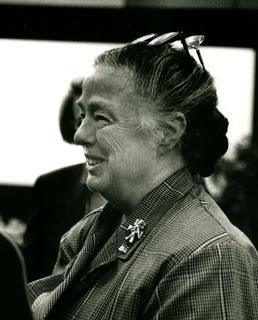Advertisement
'Charlie On The MTA' Folklorist Spoke To Riders' Frustrations

Fare hikes are not unique to contemporary rail riders. Folklorist Bess Lomax Hawes spoke to the frustrations of money-conscious commuters back in the '40s when she co-wrote the now-legendary political song, "Charlie on the MTA."
Hawes died this past Friday of natural causes in Portland, Ore. She was 88.
Ms. Hawes wrote the song in Cambridge in 1948. At the time she was active in the folk scene, singing with politically oriented groups that performed around the city.
In the 40s, the dysfunctional, confusing public transportation system was a hot-button issue among the working class. A fare increase of 5 cents, from 10 to 15 cents, incited a musical response from Hawes and her friend Jacqueline Steiner.
They created a sad, cursed character named Charlie who didn't have the 5 cents it would take for him to get off the train. Poor Charlie ended up riding the rails forever. His sorry tale unfolds in the lyrics penned by Hawes and Steiner.
The ditty wound up influencing the public during the mayoral race of 1949 with its endorsement of Progressive Party candidate Walter O'Brien.
While O'Brien didn't win the election, Hawes' song went on to galvanize a signature campaign that ultimately drove the Metropolitan Transit Authority to reverse the imposed fare hike.
Ms. Hawes first recorded the song with her husband and co-writer Baldwin "Butch" Hawes. It was catchy and popular, but it didn't become an international hit until The Kingston Trio covered it a decade later.
The Dropkick Murphy's, a local punk band, did their own version in 1998 titled, "Skinhead on the MBTA."
Ms. Hawes remained influential throughout her life, particularly in the folk world. After leaving Cambridge, she taught at California State University in Northridge. In 1977, she headed the folk and traditional arts program at at the National Endowment of the Arts. The list of her academic and personal accomplishments is extensive.
Folk music, and the drive to know everything about it, apparently coursed through Ms. Hawes' veins. Her father, John Lomax, created the folk song archives at the Library of Congress. And her brother, Alan Lomax, was the musicologist and anthropologist best known for his pure, gritty recordings of real-people musicians in the Mississippi Delta.
As a person, Bess Lomax Hawes was "generous and giving," according to Peggy Seeger, sister of folk legend Pete Seeger. Peggy Seeger, now a Boston resident, remembered meeting Ms. Hawes in California as a child. Hawes worked with Seeger's mother, Ruth Crawford Seeger, as an assistant. "She was a gentle and welcoming person," Peggy Seeger said of Hawes, adding, "Her legacy is astounding."
Bess Lomax Hawes is survived by three children who all went on to pursue careers in the folk and anthropological fields. She will be remembered in a small family service next week.
Lyrics: "Charlie On The MTA"Let me tell you the story
Of a man named Charlie
On a tragic and fateful day
He put ten cents in his pocket,
Kissed his wife and family
Went to ride on the MTA
Charlie handed in his dime
At the Kendall Square Station
And he changed for Jamaica Plain
When he got there the conductor told him,
"One more nickel."
Charlie could not get off that train.
Chorus:
Did he ever return,
No he never returned
And his fate is still unlearn'd
He may ride forever
'neath the streets of Boston
He's the man who never returned.
Now all night long
Charlie rides through the tunnels
the station
Saying, "What will become of me?
Crying
How can I afford to see
My sister in Chelsea
Or my cousin in Roxbury?"
Charlie's wife goes down
To the Scollay Square station
Every day at quarter past two
And through the open window
She hands Charlie a sandwich
As the train comes rumblin' through.
As his train rolled on
underneath Greater Boston
Charlie looked around and sighed:
"Well, I'm sore and disgusted
And I'm absolutely busted;
I guess this is my last long ride."
{this entire verse was replaced by a banjo solo}
Now you citizens of Boston,
Don't you think it's a scandal
That the people have to pay and pay
Vote for Walter A. O'Brien
Fight the fare increase!
And fight the fare increase
Vote for George O'Brien!
Get poor Charlie off the MTA.
Chorus:
Or else he'll never return,
No he'll never return
And his fate will be unlearned
He may ride forever
'neath the streets of Boston
He's the man (Who's the man)
He's the man who never returned.
He's the man (Oh, the man)
He's the man who never returned.
He's the man who never returned.
This program aired on December 1, 2009. The audio for this program is not available.

